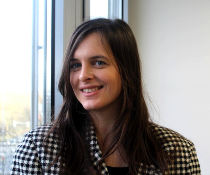
Universität Bremen
Tel.: +49 421 218 66293
Email:
Institut Technik und Bildung (ITB), Room: Room 2.27
Affiliated Ph.D. Fellow, Cohort 2024
Dissertation topic
Teaching in Transit: Practices, Potentials und Problems in Language Programmes for (forced) Migrants in Southeastern Europe
Dissertation abstract
Teaching in Transit: Practices, Potentials, and Problems of Civil Society Language Education Programs for Adult Refugees in Southeastern Europe
This project examines civil society language education initiatives for adult refugees in the transit countries of Bulgaria and Macedonia, which are regions where state-supported integration programs are largely absent. The focus lies on translanguaging and other multilingual practices in the classroom, as well as on the perspectives of both learners and teachers.
The cumulative dissertation consists of four articles:
The first article analyzes intersectional inequalities in Bulgarian language classes, showing how race and citizenship status structure the distribution of attention and recognition in the classroom.
The second article explores educational self-organization processes among Ukrainian refugees in Macedonia, highlighting the role of informal networks and social capital in accessing and implementing language courses.
The third article investigates how teachers apply translanguaging, plurilingual pedagogies, or other multilingual practices in their teaching, and to what extent these align with their language ideologies and pedagogical beliefs.
The fourth article centers on learners’ perspectives and practices, analyzing how they actively use and reflect on their linguistic repertoires, particularly through translanguaging.
The research is based on an ethnographic design and a rich empirical dataset, including participant observations in classrooms, semi-structured interviews with teachers, learners, and program coordinators, group discussions, and detailed field notes. Methodologically, the project is grounded in mediated discourse analysis and also employs mapping techniques from situational analysis. Theoretically, it draws on concepts of translanguaging, scholarship on intersectionality, and Bourdieu’s sociology of language to explore the interrelations between language ideologies and classroom practices.
By focusing on an under-researched region and educational context, the project makes an important contribution to migration studies, adult education, and sociolinguistics. Furthermore, it deepens our understanding of the role of language in contexts of displacement and transit, illustrating how civil society actors, multilingual practices, and migrant agency shape educational spaces.
Academic Supervisors
Alisha M. B. Heinemann
Hannes Schweiger
